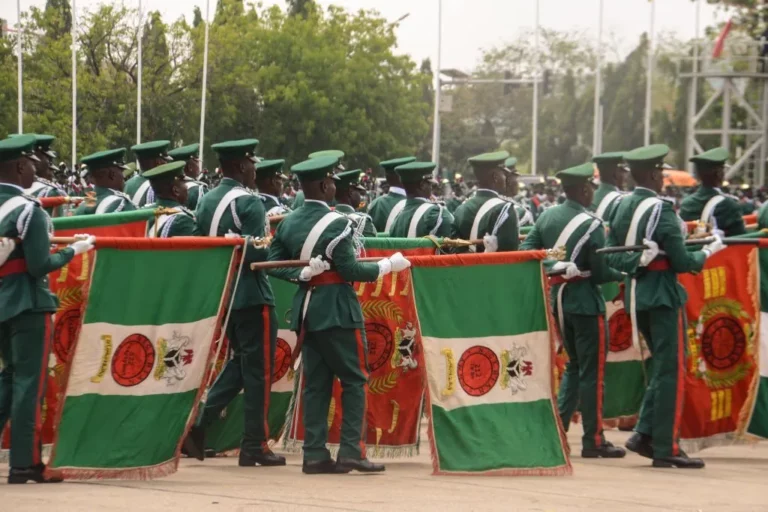The Nigerian armed forces play a crucial role in safeguarding the country against external and internal threats. Comprising the army, navy, and air force, they are the backbone of Nigeria’s defense system. Each branch of the armed forces has its own unique rank structure, which is vital for maintaining discipline, command, and operational effectiveness. In this comprehensive guide, we will explore the different army ranks in Nigeria, their symbols, and the responsibilities associated with each rank.
Nigerian Army Rank Structure

The Nigerian Army’s rank structure is similar to that of the United Kingdom, consisting of commissioned and non-commissioned officers. Commissioned officers hold higher ranks and are responsible for leading troops, while non-commissioned officers play a vital role in maintaining discipline and supporting the operations of the army.
Non-Commissioned Officers
Non-commissioned officers (NCOs) form the backbone of the Nigerian Army. They are responsible for the day-to-day functioning of the army and provide leadership and guidance to the soldiers under their command.
Private Soldier
The rank of Private Soldier is the entry-level position in the Nigerian Army. It is awarded to new recruits and individuals who have undergone disciplinary action. Private Soldiers play an essential role in supporting the operations of the army but do not hold any leadership positions. They wear no uniform insignia.
Lance Corporal
Lance Corporal is the lowest non-commissioned officer rank in the Nigerian Army. Derived from the Italian word “lancepesade,” meaning officer of the lowest rank, Lance Corporals possess limited leadership responsibilities. They wear a single “V” shape as their rank symbol.
Corporal
Corporal is a level-4 non-commissioned officer rank in the Nigerian Army. They can lead the smallest unit or team within the army and are responsible for ensuring the personal appearance and cleanliness of soldiers under their command. Corporals have two “V” marks on their shoulder as their rank symbol.
Sergeant
Sergeants are junior non-commissioned officers who oversee the daily tasks and activities of the soldiers under their command. They may also lead a team comprising multiple corporals. Recognizable by the three “V” symbols on their shoulder, sergeants play a crucial role in maintaining discipline and morale within their units.
Staff Sergeant
Staff Sergeants are senior non-commissioned officers who have a greater number of soldiers under their command compared to sergeants. They ensure the promotion and development of low-ranked soldiers, utilizing their full potential. A staff sergeant has a golden eagle on top of the three “V” marks on their shoulder.
Warrant Officer
Warrant Officers in the Nigerian Army are highly specialized experts responsible for training soldiers. They assist the Master Warrant Officer in maintaining and managing the army’s weapons and equipment. Warrant Officers also assign tasks to soldiers within their squad, unit, or crew. Their rank symbol consists of a golden eagle surrounded by a golden crown made of olive leaves.
Master Warrant Officer
The Master Warrant Officer is the principal non-commissioned officer in the Nigerian Army. They are responsible for overseeing other non-commissioned officers and dispatching leadership roles. Master Warrant Officers are in charge of military equipment and wear the Nigerian coat of arms with silver horses instead of white, painted gold.
Commissioned Officers

Commissioned officers in the Nigerian Army hold higher ranks and are responsible for leading troops, making critical decisions, and ensuring the operational effectiveness of the army.
Second Lieutenant
The rank of Second Lieutenant marks the beginning of the commissioned officer ranks. Second Lieutenants assist First Lieutenants and hold the lowest position in the commissioned officer hierarchy. They wear a single star on each shoulder as their rank insignia.
First Lieutenant
First Lieutenants are junior officers who assist Captains and are responsible for overseeing a platoon or troop. They play a crucial role in the tactical operations of the army. First Lieutenants wear two silver stars aligned vertically as their rank symbol.
Captain
Captains hold the rank of the highest tactical troops and are responsible for commanding or serving as the second-in-command of a company. They play a significant role in leading soldiers and making tactical decisions. Captains are recognizable by three silver stars aligned vertically.
Major
Majors are the lowest category of commissioned field officers. They hold a position between Captain and Lieutenant Colonel and are responsible for commanding troops in various operations. Majors wear a silver eagle on their shoulders as their rank symbol.
Lieutenant Colonel
Lieutenant Colonels are middle-level field officers who command a considerable number of troops and units. They may be appointed as battalion commanders and play a vital role in executing major tactical operations. Their rank symbol consists of an eagle with silver lining and one star.
Colonel
Colonels hold a ceremonial and political role in the Nigerian Army. They may serve as advisors to senior officers and take up staff positions between field commands. Their rank insignia is one silver eagle and two stars aligned vertically.
Brigadier General
Brigadier Generals hold a senior position in the commissioned officer ranks. They command a significant number of troops and play a crucial role in strategic planning. Brigadier Generals wear one silver eagle and three stars arranged in a triangular form.
Major General
Major Generals are two-star ranked commissioned officers responsible for major tactical operations, including battles and engagements. They command divisions comprising thousands of troops. The rank symbol of a Major General consists of a crossed baton and sword below a golden eagle on their shoulders.
Lieutenant General
Lieutenant Generals hold a three-star rank and are senior commissioned officers appointed by the president. They play a crucial role in high-level decision-making and strategic planning. Lieutenant Generals wear a golden crossed baton and sword, a star, and an eagle on their shoulders.
General
Generals are the second-highest rank of commissioned officers and are responsible for planning the operations of lower-ranked officers on the field. They hold a four-star rank and play a crucial role in overseeing the army’s activities. The insignia of a General consists of a crossed baton and sword, two stars, and an eagle, all painted in gold.
Field Marshal
Field Marshal is the highest and most prestigious rank in the Nigerian Army, though no Nigerian soldier has ever attained this rank. It is awarded based on exceptional military achievements, service, loyalty, dedication, and bravery. The insignia of a Field Marshal consists of an all-gold crossed baton and sword, surrounded by two branches and an eagle.
Conclusion

Understanding the rank structure in the Nigerian Army is essential for maintaining discipline, command, and operational effectiveness. From the entry-level Private Soldier to the prestigious Field Marshal, each rank plays a unique role in serving and protecting the nation. By familiarizing ourselves with these ranks and their symbols, we can appreciate the dedication and sacrifice of the men and women who serve in the Nigerian Army.






